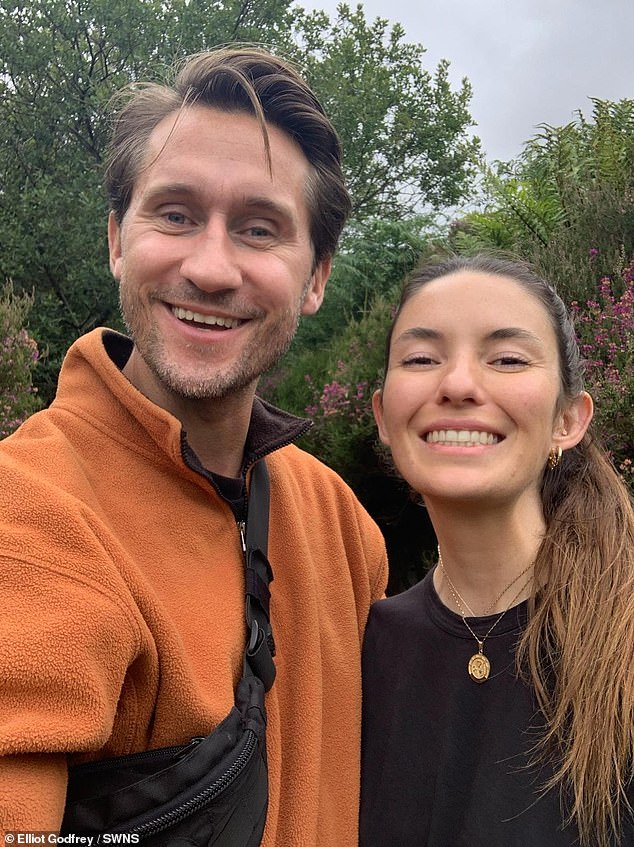[ad_1]
A father has told of his horror after he was diagnosed with an incurable brain tumour just days after his son turned one.
Elliot Godfrey, from Waddesdon in Buckinghamshire, suddenly began experiencing migraines in March following a family holiday in Mexico.
But the 42-year-old dismissed the headaches as merely the stress and tiredness of being a new dad.
It was only when his friends noticed his discomfort during his son, Aein’s, first birthday party that they urged him to seek medical help.
After his symptoms worsened he was rushed to John Radcliffe hospital in Oxford.
In April, scans revealed that he has a high-grade glioblastoma—one of the deadliest types of brain tumours.
Typical treatment plans for the ‘aggressive’ cancer—which strikes around 3,000 Brits and 12,000 Americans each year—sees patients have surgery before chemo and radiotherapy.
This is still the same way it was treated in the early 2000s.

Elliot Godfrey, from Waddesdon in Buckinghamshire, suddenly began experiencing migraines in March following a family holiday in Mexico. Pictured, with wife Jess

The 42-year-old dismissed the headaches as merely the stress and tiredness of being a new dad. Pictured, Mr Godfrey in hospital after brain surgery
Mr Godfrey, an ex-professional golfer who now owns a golf simulation business, has now undergone surgery to remove 95 per cent of the tumour as well as weeks of gruelling radiotherapy and chemotherapy.
Recalling his devastating diagnosis, he said: ‘They [the doctors] gave me a 20 per cent chance that I could die from surgery.
‘Sitting there with my family that, was obviously pretty devastating and quite scary.
‘I googled it and the first thing I saw was a picture of Arnold Schwarzenegger as Terminator.
‘They literally called it the “Terminator cancer’—the survival rates and the reality of living with this hit really hard.’
He added: ‘When I got home, my son Aein’s one-year-old birthday balloon was still there.
‘I sat there, and I thought “will I get to see two, will I get to see four?”
‘I just want to be here for as long as possible for him.

It was only when his friends noticed his discomfort during his son, Aein’s, first birthday party that they urged him to seek medical help. After his symptoms worsened he was rushed to John Radcliffe hospital in Oxford

Scans eventually revealed in April that the devastating cause was a high-grade glioblastoma—one of the deadliest types of brain tumours
‘One of the hardest things is you’re processing it yourself and also seeing all the people that you love going through trauma.
‘You kind of feel guilty, like you’ve let everybody down.
‘I’m incredibly lucky to have my network around me. I didn’t think I could love my wife Jess any more but how much she’s been there for me every single day is overwhelming.
‘She was already the love of my life, but she’s gone up a tier or two.’
Diagnosed patients usually undergo surgery to remove as much of the tumour as possible.
This is followed by daily radiation and chemo drugs for around six weeks, after which the drugs are scaled back.
Radiation can be then used to destroy additional tumour cells and treat those who are not well enough for surgery. But the cancer can double in size in just seven weeks.
Mr Godfrey is currently nearing the end of his six-week course of radiotherapy and chemotherapy but is also tirelessly researching the next steps.

Mr Godfrey is currently nearing the end of his six-week course of radiotherapy and chemotherapy but is also tirelessly researching the next steps. Pictured, during radiotherapy treatment

The cancer killed Labour politician Dame Tessa Jowell in 2018

The Wanted singer Tom Parker (pictured with his wife Kelsey Parker in October 2021) died in March 2022 following an 18-month battle with stage four glioblastoma
Last month, Mr Godfrey launched a GoFundMe page to raise funds to undergo experimental treatments, and raised over £141,000 to date.
He hopes to undergo two treatments in Germany that offer ‘glimmers of light’.
Both have shown promise in early-stage clinical trials but are yet to be approved for routine use on the NHS.
One, Tumour Treating Fields, uses a battery-powered cap worn 18-hours a day to disrupt cancer cell division.
The other, Dendritic Cell Vaccine Therapy, retrains the immune system to attack cancer cells.
‘The GoFundMe page was something that was quite hard to do because I hate asking for help, but it has restored my faith in humanity,’ Mr Godfrey said.
‘You read about all the bad things that happen in the world, but people are kind and people do want to help each other.’
He added: ‘I’m doing absolutely everything I can to increase my chances of long-term survival.
‘Because of my professional sports person attitude, I’ve turned this into my life.
‘I’ve gone onto a diet, I’m out running, I’m training.
‘We have to keep our foot on the gas—I’m trying to take myself as far into the expected survival as I can because I can’t bear to think that’s how long I’ve got.
‘Doctors say if they didn’t have my notes, they wouldn’t believe I had a glioblastoma.
‘I feel like for someone with a glioblastoma, grade four, unmethylated, wild type, I’m doing a pretty good job—just trying to keep positive energy and kill it with kindness.’
Average survival time for glioblastoma is between 12 and 18 months, according to the Brain Tumour Charity. Only 5 per cent of patients survive five years, it says.
The disease killed the Labour politician Dame Tessa Jowell in 2018.
In March 2022, The Wanted singer Tom Parker also died following an 18-month battle with stage four glioblastoma.
[ad_2]
This article was originally published by a www.dailymail.co.uk . Read the Original article here. .

